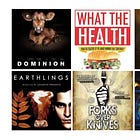Documentaries Are Still Underused in Vegan Outreach – Here’s How to Use Their Full Potential
When used right, movies can change minds — and save lives.
If you’re passionate about veganism, you already know how important it is to inspire change. But what’s the best way to reach people? There’s no single answer, but after years in animal rights circles, one pattern consistently stands out:
Nearly every vegan I know was influenced by a documentary film that opened their eyes to the realities of animal agriculture. The same goes for many well-known animal rights activists — including probably the most famous one out there, Earthling Ed, who went vegan in 2015 after watching the documentary ‘Earthlings’ — the film that also inspired his name.
Documentaries are an incredibly powerful tool that everyone can use. We should make them a bigger part of our outreach efforts. In this article, I break down why documentaries are such powerful changemakers — and how we can best leverage that power for our movement.
Why Documentaries Work
We live in a world where people are deeply disconnected from the consequences of their choices. Most have never seen the inside of a slaughterhouse, the environmental destruction caused by animal agriculture, or the caged beings who suffer behind their food. Documentaries break that illusion. They don’t just inform; they make people feel.
Unlike facts and arguments alone, documentaries:
Create an immediate emotional connection
Show unfiltered reality that’s hard to ignore
Make an impact that sticks in people’s minds
This emotional engagement is crucial. For many, the reason they continue to support animal exploitation isn’t a lack of information or empathy — it’s a lack of immediacy. Documentaries bridge that gap, making the destruction tangible, the victims visible, and their suffering deeply relatable.
How to Use Documentaries for Vegan Advocacy
📽 Watch together
Recommending great documentaries is important, but people are less likely to watch them on their own. If you can, take the opportunity to invite friends or family over, or organize a screening in your community. Watching together makes the experience more impactful and opens the door for meaningful conversation afterward.
🎯 Tailor your recommendations
Some people are moved by animal suffering, others by health risks or environmental urgency. If your audience is small and you’re familiar with their values and interests, match the documentary to what they already care about — and they’ll be more open to the message.
🪴 Plant the seed — don’t force the growth
Some people take time to digest what they’ve seen. Avoid pressure or judgment. You can gently ask open-ended questions like “What stood out to you?” or “Did anything surprise you?” This encourages reflection without putting them on the spot. Slightly more challenging questions like “Do you want to keep supporting that with your money?” can also land powerfully — when the moment is right.
📚 Be ready with follow-up resources
Documentaries spark curiosity, but they’re just the beginning. If someone in your audience is looking for more resources — like books, recipe links, and useful websites — the Vegan Cheat Sheet is a great place to start.
🧘 Self-care matters
Films with graphic content can be emotionally intense. Let people know it’s okay to take breaks, feel upset, or need space afterward. This website offers additional advice, if needed: dominionmovement.com/self-care
🍽 Make it social — and delicious
Pair the screening with a vegan dinner, snacks, or potluck (I’d recommend eating beforehand if you're showing a graphic film focused on animal exploitation). Delicious food sets a relaxed tone and demonstrates that plant-based eating is enjoyable and accessible. A full stomach = open mind.
🗣 Open with a few words (optional)
If you’re hosting a screening, a short intro (even just 1–2 minutes) can help frame the experience: why you’re showing the film, what it meant to you, and an invitation to share thoughts afterward. Keep it warm and low-pressure.
🤝 Team up with other vegans
If possible, co-host a screening with other plant-based friends. The presence of more supportive people can help foster a welcoming and curious atmosphere, especially for those watching for the first time.
Which documentary should I choose?
In the article linked below, you'll find a handpicked selection of the most impactful documentaries on animal ethics, environmental destruction, and human health — films that inform, challenge, and inspire change.
A selection of my favorite short clips will be coming soon. Subscribe to stay updated.
What’s your favorite vegan documentary or video clip — and why? Tell us in the comments!
We have this powerful tool. Let’s use it.
Thank you so much for reading! Vegan Horizon is a reader-supported publication. To receive new posts and support my work, consider becoming a free or paid subscriber. 👇







Documentaries do indeed inspire some people to take action for animals, as surveys show. For example, in the US and Canada, approximately 13% were compelled to get involved in the movement after watching a full-length documentary, such as Earthlings.
https://faunalytics.org/animal-advocacy-in-the-u-s-canada-advocate-origins/
In Australia, when asked what influenced people to seriously consider veganism for the first time, just under 25% reported a documentary.
https://faunalytics.org/what-influences-people-to-go-vegan/
There are also studies on the impact of documentaries on meat consumption, for example:
https://faunalytics.org/how-effective-is-cowspiracy/
https://faunalytics.org/a-lesson-in-bias-during-plant-based-interventions/
+Cubes of Truth with Anonymous for the Voiceless